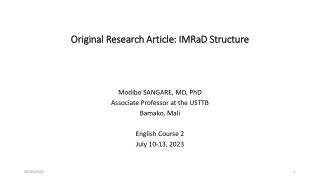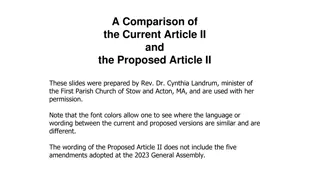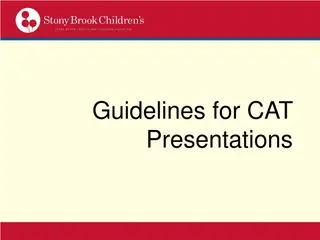
Resurrection of the Dead, Future Judgements, and Everlasting Life Explained
Explore the belief in the resurrection of the dead, future judgments, and the concept of everlasting life as supported by biblical references. Discover insights on eternal life's quality and duration, emphasizing the distinction between a temporal and qualitative perspective. Delve into the teachings of various scriptures on the fate of the righteous and the wicked in the afterlife.
Download Presentation

Please find below an Image/Link to download the presentation.
The content on the website is provided AS IS for your information and personal use only. It may not be sold, licensed, or shared on other websites without obtaining consent from the author. If you encounter any issues during the download, it is possible that the publisher has removed the file from their server.
You are allowed to download the files provided on this website for personal or commercial use, subject to the condition that they are used lawfully. All files are the property of their respective owners.
The content on the website is provided AS IS for your information and personal use only. It may not be sold, licensed, or shared on other websites without obtaining consent from the author.
E N D
Presentation Transcript
WE BELIEVE in the resurrection of the dead and future judgments from which the righteous go away into everlasting life and the wicked into everlasting punishment. Daniel 12:2 | Matthew 25:31-46 | Revelation 20:11-15, 21:26-27 Article #9
Article 9 supporting texts And many of those who sleep in the dust of the earth shall awake, some to everlasting life, and some to shame and everlasting contempt. DANIEL 12:2 MATTHEW 25:31-46 REVELATIONS 20:11-15 REVELATIONS 21:26, 27 They will bring into it the glory and the honor of the nations.27But nothing unclean will ever enter it, nor anyone who does what is detestable or false, but only those who are written in the Lamb's book of life.
resurrection of the dead and future judgments Paul before Felix Acts 24 14, 15 (ESV) But this I confess to you, that according to the Way, which they call a sect, I worship the God of our fathers, believing everything laid down by the Law and written in the Prophets, having a hope in God, which these men themselves accept, that there will be a resurrection of both the just and the unjust. Jesus John 5:25 29 (ESV): Truly, truly, I say to you, an hour is coming, and is now here, when the dead will hear the voice of the Son of God, and those who hear will live. For as the Father has life in himself, so he has granted the Son also to have life in himself. And he has given him authority to execute judgment, because he is the Son of Man. Do not marvel at this, for an hour is coming when all who are in the tombs will hear his voice and come out, those who have done good to the resurrection of life, and those who have done evil to the resurrection of judgment.
resurrection of the dead and future judgments And just as it is appointed for man to die once, and after that comes judgment,28so Christ, having been offered once to bear the sins of many, will appear a second time, not to deal with sin but to save those who are eagerly waiting for him. HEBREWS 9:27, 28.
everlasting life Eternal life is not simply the quantity (how long) but also the quality of the life (how good). One Greek Lexicon is very helpful in this pursuit: In combination with there is evidently not only a temporal element, but also a qualitative distinction. In such contexts, evidently carries certain implications associated with in relationship to divine and supernatural attributes. If one translates eternal life as simply never dying, there may be serious misunderstandings, since persons may assume that never dying refers only to physical existence rather than to spiritual death. Accordingly, some translators have rendered eternal life as unending real life, so as to introduce a qualitative distinction. (Louw-Nida) https://www.thegospelcoalition.org/blogs/erik-raymond/what-does-it-mean-to-have-eternal- life/#:~:text=It%20is%20received%20by%20believing,perish%20but%20have%20eternal%20life.
everlasting life A brief survey of the primary elements in the concept of eternal life clearly shows that it is not simply an endless or everlasting life. Although there are no final boundaries to eternal life, the Bible s primary emphasis is on the quality of life, especially its redemptive elements. Eternal life is the importation of the qualities of the age to come into the present through the revelation of a faithful God in Christ, and brings knowledge of God s relationship with him. Walter A. Elwell and Barry J. Beitzel, Eternal Life, in Baker Encyclopedia of the Bible (Grand Rapids, MI: Baker Book House, 1988), 725.
everlasting life involves relational knowledge Jesus added further content to the concept of eternal life by connecting it with knowing the true God (Jn 17:3). In Greek thought knowledge referred to the result of either contemplation or mystical ecstasy. In the OT, however, knowledge meant experience, relationship, fellowship, and concern (cf. Jer 31:34). This connotation of knowledge as intimate relationship is underlined by the usage of the verb form to designate sexual relations between male and female (cf. Gn 4:1). Jesus stated, I am the good shepherd; I know my own and my own know me, as the Father knows me and I know the Father (Jn 10:14, 15). The intimate and mutual relationship of Father and Son is the model for the relationship of the Son and his disciples. This knowledge does not come by education or manipulation of the mind, but by revelation through the Son (Jn 1:18; cf. 14:7). Walter A. Elwell and Barry J. Beitzel, Eternal Life, in Baker Encyclopedia of the Bible (Grand Rapids, MI: Baker Book House, 1988), 725.
everlasting life for the believer has already begun The central emphasis of John s Gospel, however, does not lie in the anticipated future, but in the present experience of that future life. The life of the age to come is already available in Christ to the believer. The metaphors with which Jesus defined his own mission emphasize the present new life: living water that is a spring of water welling up to eternal life (Jn 4:14); living bread that satisfies the world s spiritual hunger (Jn 6:35 40); the light of the world who leads his followers into the light of life (Jn 8:12); the good shepherd who brings abundant life (Jn 10:10); the life giver who raises the dead (Jn 11:25); the way, the truth, and the life (Jn 14:6); and the genuine vine who sustains those who abide in him (Jn 15:5). Walter A. Elwell and Barry J. Beitzel, Eternal Life, in Baker Encyclopedia of the Bible (Grand Rapids, MI: Baker Book House, 1988), 725.
Heaven Heaven as the abode of God. The angel of the Lord calls to Abraham from heaven (Gen 22:11, 15). The Lord is subsequently said to be the God of heaven (Gen 24:3, 7). Surely God does not live among the clouds or the stars heaven and the highest heaven cannot contain [God] (1 Kgs 8:27). Deuteronomy confirms that heaven is indeed something more, calling on God to look down from your holy habitation, from heaven (Deut 26:15). Solomon in his prayer of dedication at the temple in 1 Kings says to the Lord, Listen in heaven your dwelling place (1 Kgs 8:30). David says, The Lord looks down from heaven on the children of man (Ps 14:2; cf. Isa 63:15). Heaven is God s throne (Ps 103:10; Isa 66:1). Jesus prays to our Father in heaven (Matt 6:9). And it was a voice from heaven that validated him at the launch of his public ministry (Matt 3:17). Jesus called himself he who descended from heaven (John 3:13), and of course it was up into heaven that he was taken at his ascension (Acts 1:11). The holy places in the earthly tabernacle and temple were only copies of the true things in heaven (Heb 9:24). Mark Ward, Heaven, in Lexham Survey of Theology, ed. Mark Ward et al. (Bellingham, WA: Lexham Press, 2018).
Heaven Heaven as the abode of angels. God is not alone in heaven. Jacob has a divinely given dream in which angels ascend a ladder that reached to heaven (Gen 28:12). The prophet Micaiah likewise saw a vision of the Lord sitting on his throne, and all the host of heaven standing beside him (1 Kgs 22:19). Isaiah had a similar but more specific vision, seeing particular angels (seraphim) and hearing what they proclaimed around the divine throne: Holy, holy, holy is the Lord of hosts! (Isa 6:2). Mark Ward, Heaven, in Lexham Survey of Theology, ed. Mark Ward et al. (Bellingham, WA: Lexham Press, 2018).
Heaven Heaven as metonymy for God. Heaven can even serve as a metonymy for God himself (much as the White House said today is metonymy for the US president). Daniel said to Nebuchadnezzar, Your kingdom shall be confirmed for you from the time that you know that Heaven rules (Dan 4:26). Jesus does the same: Was the baptism of John from heaven or from man? (Mark 11:30). The publican would not even lift up his eyes to heaven (Luke 18:13). Mark Ward, Heaven, in Lexham Survey of Theology, ed. Mark Ward et al. (Bellingham, WA: Lexham Press, 2018).
Heaven Heaven as the future abode of the redeemed. The Old Testament only hints at what Jesus openly states: heaven is also the future abode of the redeemed. Christ tells his soon-to-be- persecuted followers, Your reward is great in heaven (Matt 5:12). He urges them to lay up treasures in heaven (Matt 6:20), where presumably they will be able to access those treasures but thieves, moth, and rust won t (cf. Luke 12:33; Mark 10:21). In my Father s house are many rooms, Jesus tells his disciples, and if I go and prepare a place for you, I will come again and will take you to myself, that where I am you may be also (John 14:2 3). Indeed, many will come from east and west and recline at table with Abraham, Isaac, and Jacob in the kingdom of heaven (Matt 8:11). To go to heaven is to enter life (Mark 9:43) and to enter the joy of [the] Master (Matt 25:21). Paul says, We have a building from God, a house not made with hands, eternal in the heavens (2 Cor 5:1). Even now in the already, our citizenship is in heaven (Phil 3:20). Peter tells Christians they have an inheritance that is imperishable, undefiled, and unfading, kept in heaven for you (1 Pet 1:4). Believers rightly look forward to this day: in this tent [i.e., our bodies] we groan, longing to put on our heavenly dwelling (2 Cor 5:2). That dwelling will itself be physical, for we are promised resurrection (1 Cor 15:42 44). Mark Ward, Heaven, in Lexham Survey of Theology, ed. Mark Ward et al. (Bellingham, WA: Lexham Press, 2018)
Heaven Heaven as rest and work. Heaven is a place of rest (Heb 4:1, 11) but not of inactivity. Even now, God s will is done in heaven (Matt 6:10), and in the age to come, Christ will give authority to his followers to rule in heaven (Matt 25:23; Luke 19:17, 19; Matt 24:47; Luke 12:44). We will reign with him, Paul says (2 Tim 2:12). This truth points to the future plan of God, because heaven, though eternal, is not the permanent abode of the redeemed not exactly. Mark Ward, Heaven, in Lexham Survey of Theology, ed. Mark Ward et al. (Bellingham, WA: Lexham Press, 2018).
Heaven The new heavens and the new earth. God s plan, through Christ, has always been to unite all things in him, things in heaven and things on earth (Eph 1:10). It has been through him to reconcile to himself all things, whether on earth or in heaven (Col 1:20). Thus we all await new heavens and a new earth in which righteousness dwells (2 Pet 3:13). And this is precisely what John sees in his epic vision of the future: I saw a new heaven and a new earth, for the first heaven and the first earth had passed away, and the sea was no more. And I saw the holy city, new Jerusalem, coming down out of heaven from God (Rev 21:1 2). He hears an angel proclaim not that believers will go to heaven when they die, ever to be with the Lord, but, astoundingly, the opposite: The dwelling place of God is with man. He will dwell with them, and they will be his people, and God himself will be with them as their God (Rev 21:3). The story of the Bible is of heaven and earth splitting apart due to human sin and then coming back together by the atoning work of God s Son. The very last mention of heaven in Scripture is a reiteration of what John has already reported: the holy city Jerusalem coming down out of heaven from God (Rev 21:10). Mark Ward, Heaven, in Lexham Survey of Theology, ed. Mark Ward et al. (Bellingham, WA: Lexham Press, 2018).
everlasting punishment On at least five occasions, the Bible links the word eternal with another that means judgement . Matthew 25: 41- 46 Then he will say to those on his left, Depart from me, you who are cursed, into the eternal fire prepared for the devil and his angels.For I was hungry and you gave me nothing to eat, I was thirsty and you gave me nothing to drink,I was a stranger and you did not invite me in, I needed clothes and you did not clothe me, I was sick and in prison and you did not look after me. They also will answer, Lord, when did we see you hungry or thirsty or a stranger or needing clothes or sick or in prison, and did not help you? He will reply, Truly I tell you, whatever you did not do for one of the least of these, you did not do for me. Then they will go away to eternal punishment, but the righteous to eternal life.
everlasting punishment 2 Thessalonians 1:5-10 this is evidence that God s judgment is right, and as a result you will be counted worthy of the kingdom of God, for which you are suffering.6God is just: He will pay back trouble to those who trouble you7and give relief to you who are troubled, and to us as well. This will happen when the Lord Jesus is revealed from heaven in blazing fire with his powerful angels.8He will punish those who do not know God and do not obey the gospel of our Lord Jesus.9They will be punished with everlasting destruction and shut out from the presence of the Lord and from the glory of his might10on the day he comes to be glorified in his holy people and to be marveled at among all those who have believed. This includes you, because you believed our testimony to you.
everlasting punishment Hebrews 6:1, 2 Therefore let us move beyond the elementary teachings about Christ and be taken forward to maturity, not laying again the foundation of repentance from acts that lead to death, and of faith in God,instruction about cleansing rites, the laying on of hands, the resurrection of the dead, and eternal judgment.
everlasting punishment Jude 7: As Sodom and Gomorrah, and the cities around them in a similar manner to these, having given themselves over to sexual immorality and gone after strange flesh, are set forth as an example, suffering the vengeance of eternal fire .
Hell The term hell is an Anglo-Saxon word, possibly of Norse origins. The term originally seems to have been associated with mythological rulers of the Germanic underworld. For this reason, it came to be a word referring to the underworld. Later, hell became the way that the biblical terms gehenna and, often, sheol were translated in the King James Version (modern English Bible translations tend to follow the KJV s rendering of gehenna but to leave sheol untranslated). The New Testament, following the lead of the LXX, often translates sheol with hades, a term borrowed from the Greek mythological underworld. In the Old Testament, sheol frequently has a more neutral meaning. Oftentimes it refers to the realm of the dead in general (Deut 32:22; 1 Sam 28:11 15; Job 26:5; Pss 88:3, 5; 86:13; Isa 7:11; Ezek 31:14 16; 31:18). Other times, it simply refers to the grave (Num 16:33). Gehenna originally referred to the Valley of Hinnom, a place believed to be have been cursed because it was the location of child sacrifice (Jer 7:31; 19:2 6). Later rabbinical literature and the Targums of the Old Testament use the term to refer to a place of suffering of the damned (see Isa 66:24). Jack Kilcrease, Hell, in Lexham Survey of Theology, ed. Mark Ward et al. (Bellingham, WA: Lexham Press, 2018)
What is Hades? HADES ( , had s). A word that in ancient Greek literature could refer to the Greek god of the netherworld or the netherworld itself. By New Testament times, Hades could refer simply to death or the grave, as opposed to gehenna ( hell ), which was always a place of judgment. In the New Testament, Hades is sometimes personified (Rev 6:8; 20:13 14) and sometimes seen as a place (Matt 11:23; 16:18; Luke 10:15; 16:23; Acts 2:27, 31; Rev 1:18). In some places it is placed opposite heaven (Matt 11:23; Luke 10:15) or Abraham s bosom (Luke 16:23). In the Septuagint, had s is almost always used to translate the Hebrew (she'ol) (sheol; e.g., Psa 9:18 LXX [Eng. 9:17]; Prov 1:12; 15:11; Job 14:13). John D. Barry et al., eds., Hades, in The Lexham Bible Dictionary (Bellingham, WA: Lexham Press, 2016).
Hell Hell is the final destiny of unbelievers and is variously described by the figures of a furnace of fire, eternal fire, eternal punishment (Mt 13:42, 50; 25:41, 46); outer darkness, the place of weeping and torment (8:12); eternal sin (Mk 3:29); the wrath of God (Rom 2:5); everlasting separation from the Lord, never to see the glory of his power (2 Thes 1:9); the bottomless pit (Rv 9:1, 11); continuous torment (14:10, 11); the lake of fire, the second death (21:8); a place for the devil and his demons (Mt 25:41). The foregoing designations clearly show that the state of those in hell is one of eternal duration. Ralph E. Powell, Hell, in Baker Encyclopedia of the Bible (Grand Rapids, MI: Baker Book House, 1988), 952.
Hell A summary of all Scripture that speaks of hell indicates that there is the loss and absence of all good, and the misery and torment of an evil conscience. The most terrifying aspect is the complete and deserved separation from God and from all that is pure, holy, and beautiful. In addition there is the awareness of being under the wrath of God and of enduring the curse of a righteous sentence because of one s sins that were consciously and voluntarily committed. Ralph E. Powell, Hell, in Baker Encyclopedia of the Bible (Grand Rapids, MI: Baker Book House, 1988), 953.
Hell While there is a physical component to Hell, there is a spiritual, psychological and social component as well. Hell is hell for those who are there essentially because they are completely alienated from God, and wherever there is alienation from God there is always estrangement from one s fellows. This is the worst possible punishment to which anyone could be subject: to be totally and irrevocably cut off from God and to be at enmity with all those who are around oneself. Another painful consequence of such a condition is to be at odds with oneself torn apart from within by an accusing sense of guilt and shame. This condition is one of total conflict: with God, one s neighbors, and oneself. Ralph E. Powell, Hell, in Baker Encyclopedia of the Bible (Grand Rapids, MI: Baker Book House, 1988), 953.






















